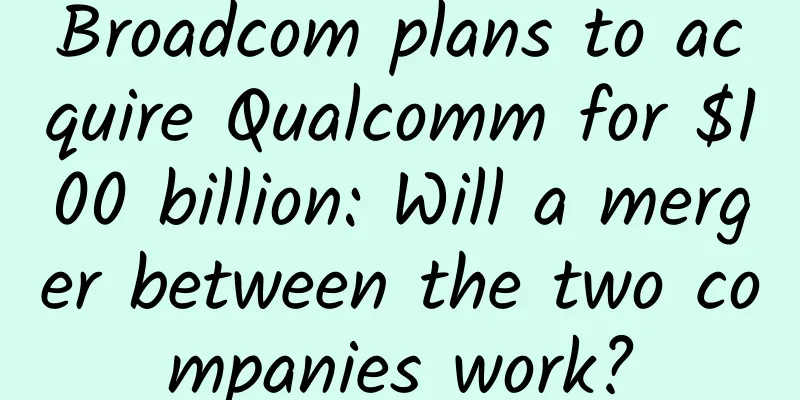Broadcom plans to acquire Qualcomm for $100 billion: Will a merger between the two companies work?

|
Really big news! Today, according to two authoritative American media outlets, Bloomberg and The Wall Street Journal, Broadcom, a semiconductor industry giant, proposed to make an unsolicited takeover offer to acquire Qualcomm, a mobile communications and chip giant, for more than $100 billion. If this $100 billion sky-high transaction is successful, it will be the first acquisition in the history of the semiconductor industry. It is reported that Broadcom plans to acquire Qualcomm for $100.3 billion in cash and stock at a price of $70 per share. Based on Qualcomm's opening share price of $55 today, the offer price is about 27% premium. Neither party has confirmed the news. This Broadcom is not that Broadcom Stimulated by this news, Qualcomm opened at $54.76 today and soared to above $62, an increase of more than 13%, the largest increase in more than a decade, and its market value quickly increased to $91.2 billion. The proposed acquirer Broadcom Limited also saw its share price soar 5.5% today, with a market value of nearly $112 billion. In fact, the Broadcom that is planning to acquire Qualcomm is no longer the Broadcom that was well known in the past. Broadcom and Qualcomm used to be an old enemy. In 2009, Broadcom sued Qualcomm for infringing its patents and eventually received a huge compensation of 890 million US dollars. However, the semiconductor company Broadcom, which was founded in 1991, was declared closed in 2016. The current Broadcom is actually Avago, a chip company that acquired the original Broadcom and retained the name. Avago was founded in 1961 and was originally the semiconductor business of HP. In 1999, HP spun off this business into Agilent. In 2005, Agilent renamed its semiconductor division Avago and sold it to private equity fund KKR for US$2.66 billion. After KKR acquired it, it packaged Avago and listed it on NASDAQ in 2009. In 2015, Avago announced that it had acquired Broadcom for $37 billion ($17 billion in cash and $20 billion in stock). Before the acquisition, Broadcom's revenue was twice that of Avago. This acquisition was a case of the small fish eating the big fish. After the acquisition was completed at the end of last year, the new company was renamed Broadcom Limited and continued to use the company name Broadcom, but the stock code continued to use AVGO, and the original Broadcom BRCM stock was delisted. However, whether this first deal in the semiconductor industry can be successful still faces many questions. Can the merger of the two companies work? The difficulties are indeed not small. The offer may not impress Qualcomm First, Broadcom's limited offer needs to be approved by Qualcomm's board of directors and shareholders. Although Broadcom's $100 billion offer is already a sky-high price, it is still somewhat undervalued for Qualcomm, a mobile giant that is in a bad state. Between 2012 and 2015, thanks to its dominance in the field of smartphone chips, Qualcomm's market value surpassed Intel several times, reaching a high of $130 billion. However, as competition in the smartphone field intensified, Qualcomm's patent licensing model suffered repeated setbacks, and Qualcomm's stock price has been sluggish for two consecutive years. Today, its market value is less than half of Intel's, which has returned to above $200 billion. The saying that Qualcomm surpassed Intel has become history. Qualcomm has been fined sky-high prices in several of its largest markets due to its suspected monopoly in patent licensing. In 2015, Qualcomm was fined $1 billion by Chinese regulators. In the world's largest smartphone market, Qualcomm chose to accept the fine. However, this year, Qualcomm was fined $773 million and $912 million by regulators in Taiwan and South Korea, respectively, and Qualcomm chose to appeal. Qualcomm was hit hard by the patent lawsuit against Apple. Apple, which contributes 12% of Qualcomm's patent licensing revenue every year, not only sued Qualcomm for suspected monopoly this year and demanded that Qualcomm return $1 billion in patent licensing fees, but also refused to pay the original $2 billion in patent fees each year. This blow directly forced Qualcomm to lower its earnings expectations. Qualcomm expects that due to the impact of Apple's patent lawsuit, the revenue of its patent licensing business in the third quarter of this year will drop by 47% to $1 billion, dragging down the company's overall revenue by 13%. Under this series of blows, Qualcomm's stock price has fallen from around $70 at the end of last year to below $50, and its market value has evaporated by nearly 30%, to just over $70 billion. However, even though Qualcomm is in a bad state, Broadcom's offer of only $70 is unlikely to impress Qualcomm's board of directors and shareholders. To acquire Qualcomm, Broadcom Limited may need to raise the price. There is another problem. Last year, Qualcomm announced that it would spend $47 billion to acquire NXP, a car networking chip company. This transaction is still awaiting review by US and European regulators. Therefore, even if Qualcomm is willing to accept Broadcom's offer, it will have to wait until the NXP transaction is completed before advancing acquisition negotiations with Broadcom. Antitrust investigations are difficult to handle Secondly, the $100 billion acquisition of Shuangtong will also face antitrust investigations from regulatory authorities, and pressure in this regard may be the real challenge. For Broadcom, the acquisition of Qualcomm is not only a $100 billion deal, but also a merger of equal size. According to IC Insights, Broadcom is the fifth largest semiconductor company in the world in terms of revenue in 2016, second only to Intel, Samsung, TSMC and Qualcomm. Broadcom's revenue last year was $15.33 billion, almost the same as Qualcomm's $15.43 billion. If Broadcom and Qualcomm really merge, the revenue of the new company will reach more than 30 billion US dollars, making it the world's third largest semiconductor company after Intel and Samsung. Broadcom's business includes smartphones, set-top boxes, wireless Wi-Fi and other related chips, and it is the main supplier of Apple and Samsung. In the wireless field, there are many overlaps in the business of Broadcom and Qualcomm. Specifically, in the field of wireless Wi-Fi chips, Broadcom and Qualcomm are the top two companies in the world respectively. Qualcomm's baseband chips can make up for Broadcom's business deficiencies. If Broadcom really swallows up Qualcomm, the new company will become the industry leader in many fields. In particular, the important chip business of Apple and Samsung's consumer electronics products will be almost monopolized by the new Broadcom company, including baseband, wifi, power amplifier, touch, wireless charging, FBAR filter chips, etc. This situation is not what giants such as Apple and Samsung want to see, and it is also a nightmare for Intel, a giant that is actively engaged in baseband chips and 5G networks. Avago, the company behind Broadcom, has completed several huge acquisitions in the past four years, including the $6.6 billion acquisition of LSI in 2013, the $37 billion acquisition of Broadcom in 2015, and the $5.9 billion acquisition of Brocade in 2016, creating a new upstart in the semiconductor industry. But these are still child's play compared to the $100 billion acquisition of Qualcomm. It is worth noting that just before the news of the proposed acquisition of Qualcomm was exposed, Broadcom CEO Hock Tan had just announced with US President Trump that the company's headquarters would be moved from Singapore back to San Jose, California, to create jobs in the United States and support Trump's "Make America Great Again" political achievement plan. Behind this move, Hock Tan is also working hard to obtain a favorable regulatory and tax reduction environment for Broadcom. After becoming an American company, Broadcom's acquisition of American companies does not need to go through the strict review of the Committee on Foreign Investment in the United States (CFIUS). However, to acquire a $100 billion giant like Qualcomm, Broadcom still needs to go through layers of review by many regulatory authorities in the United States and around the world. The $100 billion merger between Broadcom and Broadcom looks great, but to truly realize this first merger in the history of the semiconductor industry, Broadcom CEO Hock Tan still faces many challenges and tests. As a winner of Toutiao's Qingyun Plan and Baijiahao's Bai+ Plan, the 2019 Baidu Digital Author of the Year, the Baijiahao's Most Popular Author in the Technology Field, the 2019 Sogou Technology and Culture Author, and the 2021 Baijiahao Quarterly Influential Creator, he has won many awards, including the 2013 Sohu Best Industry Media Person, the 2015 China New Media Entrepreneurship Competition Beijing Third Place, the 2015 Guangmang Experience Award, the 2015 China New Media Entrepreneurship Competition Finals Third Place, and the 2018 Baidu Dynamic Annual Powerful Celebrity. |
Recommend
Promotion effect is unstable? Account performance optimization method!
While promoting information flow, the effect sudd...
This is the most awesome operational copywriting I have ever seen!
As a public account editor with less than 100 mil...
User Growth Formula: Pinduoduo’s Growth Game Thinking
Nowadays, we can often see some gamification sett...
Beyondsoft Global Headquarters Building Completed
On October 16, 2014, Beyondsoft, Asia's leadi...
Traffic password for Xiaohongshu's popular notes
I recently discovered an interesting phenomenon -...
In the AI era, will APP operations be eliminated?
As early as August 8, the official account of Chi...
Understand the massive amount of Qianchuan delivery techniques in one article!
From the underlying algorithm of the launch, brea...
I have tried all the methods taught in the book, but why are all the promotions I do useless?
I've read so many books and attended so many ...
Is it true that village cadres will be recruited in 2022? Attached is the latest policy for village cadres in the Central Government’s Document No. 1 of 2022!
As we all know, village cadres are at the forefro...
Five bosses changed in six years: What is Shanda Games trying to do?
Shanda's changes basically occurred after 200...
How to write the copy for May 1st Labor Day?
It’s not Labor Day yet. The chat mode of " w...
Android fragmentation report released
According to foreign media reports, Android fragm...
How to use Zhihu promotion to efficiently attract targeted users?
“Zhihu, share your newly made story with the worl...
Another case where AI beats humans: Authenticity check for luxury goods | Digital literacy
Audit expert: Zheng Yuanpan, professor at Zhengzh...
These 4 behaviors are very harmful to your eyes, and you will never expect the last one...
If there is an organ that works harder, I would v...









